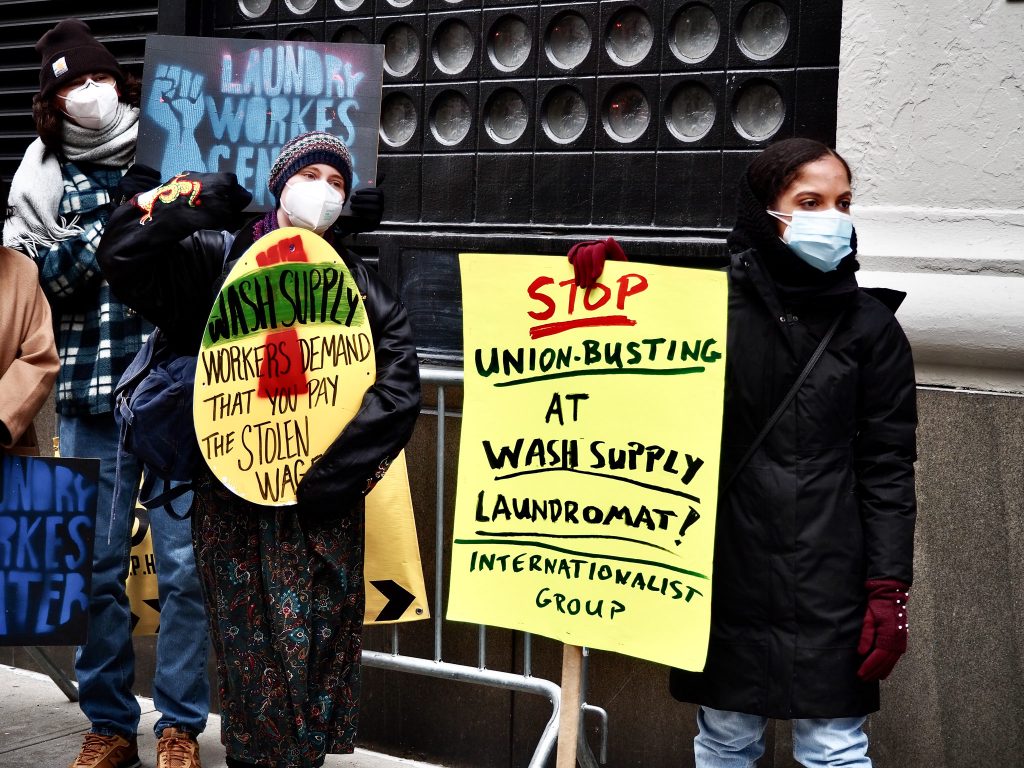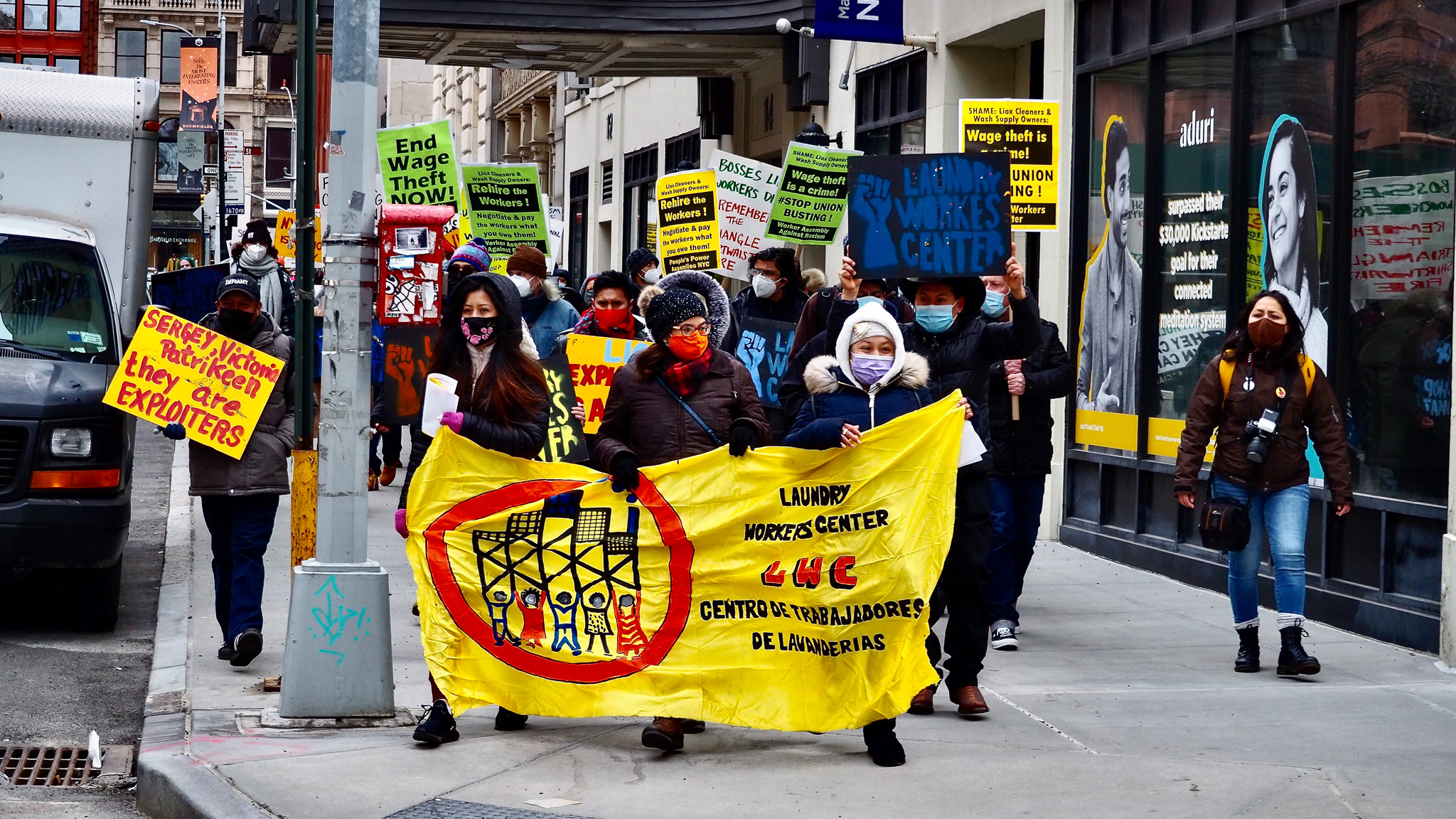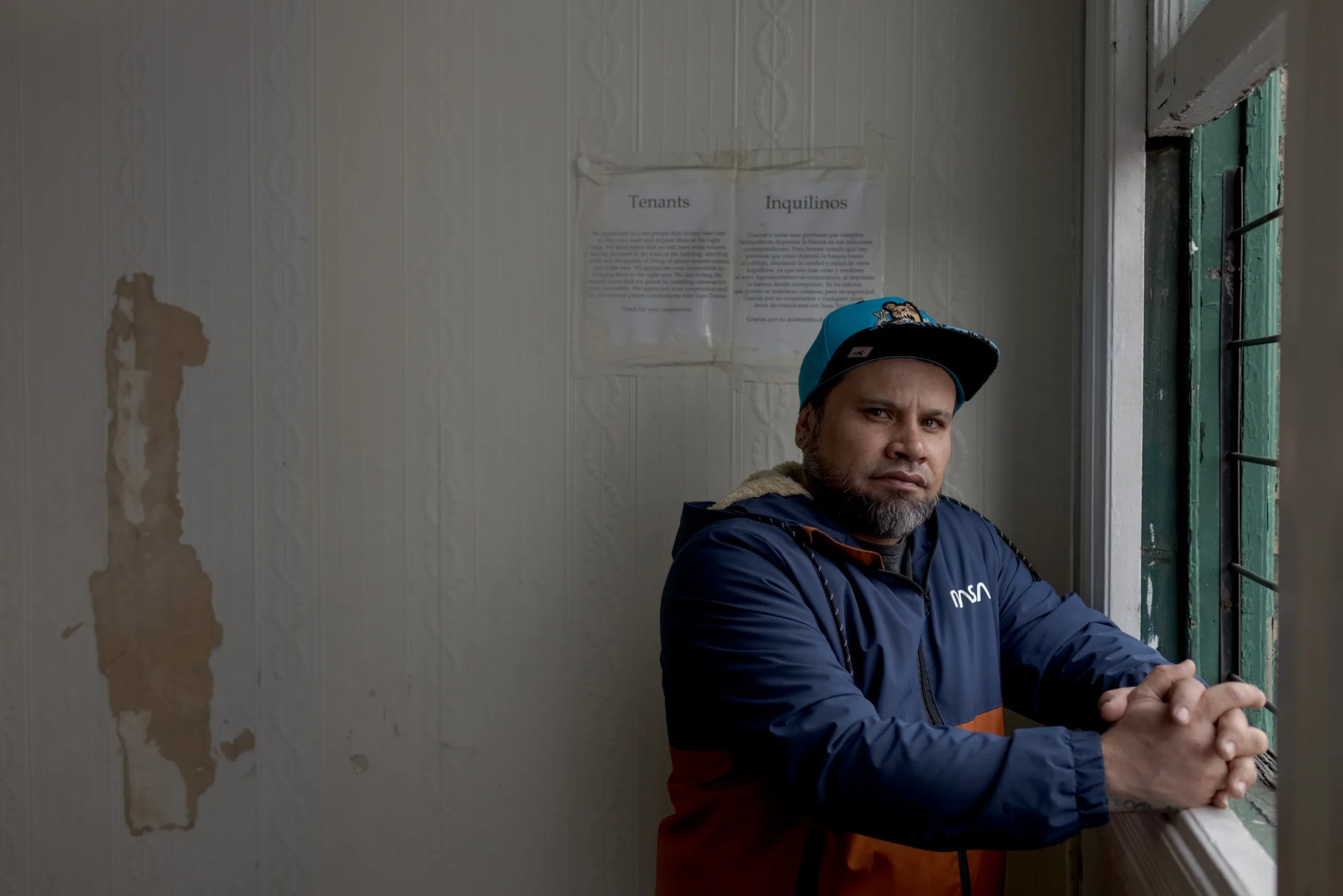On March 6th, 26-year-old laundromat worker Celia Davilla, along with two other fellow workers and several dozen supporters, braved the frigid winter weather and marched from a laundromat on the Lower East Side to the site of the infamous Triangle Shirtwaist factory fire. The march, organized by the Laundry Workers Center, was meant to bring to light the recent firing of eight employees of Liox Laundry Services which has four locations throughout Manhattan.
Workers say they were fired because of their campaign to form a union and recover stolen wages. On February 19th, the Liox owned Wash Supply Laundromat in Upper West Side abruptly shuttered and fired its workers after six of its eight immigrant women employees successfully voted to form the first storefront laundromat union in the city.
“For us, it was a huge victory because there is no other retail laundromat that formed a union in New York City,” said Rosanna Aran, co-Executive Director of the Laundry Workers Center.
The vote had taken place a few weeks earlier on January 29th, amidst an aggressive anti-union campaign by Liox that according to three laundromat workers Documented spoke to, created a climate of fear and intimidation at the workplace. Workers repeatedly told Documented that management had threatened to fire them if they voted in favor of a union.
“One of the owners told us if we formed a union they would be in bankruptcy and that they can’t continue to pay the workers and that’s why they had to fire us,” Debada told Documented. “We can’t support our family and we can’t pay our rent. We have all tried to look for another job but because of the pandemic it’s very difficult.”
For Rosanna Aran, the Liox workers’ fight is part of a wider resurgence in labor politics. The pandemic-related economic crisis has ushered in a wave of union organizing efforts around the country. Since last March, 1,100 strikes have occurred and support for unions has skyrocketed to 65 percent of Americans, according to one poll. Aran believes that the entire labor movement should be watching the fight at Liox, for a victory will be a win for the whole movement.
“We don’t want to send a bad example for other workers who want to use that right to really want to have better conditions in the workplace,” she said. “So it’s really key that the entire labor movement supports this struggle that is going to show to other workers that they can do it.”
Also Read: Essential Subway Workers Allege Underpayment and Dangerous Conditions
According to Lina Stillman, a lawyer representing the laundromat workers, Liox’s attempts to prevent the union, by intimidating the workers and firing them, is illegal. In fact, the National Labor Relations Board (NLRB) clearly states that workers can’t be “fired, disciplined, demoted, or penalized in any way” for engaging in union activities. Still, Liox’s efforts are not uncommon. U.S companies have been found to illegally disrupt 41.5 percent of all unionization efforts.
“The company failed to bargain about the decision to transfer its laundry operation to another place for anti-union reasons,” she said. “[Liox is] avoiding the obligations that they have with us to negotiate the closing of the shop and to bargain with us. That’s just how it works.”

For over two years, Davilla had worked at Wash Supply, making $8.75 an hour at first and then increasing to $11 dollars by the time she was fired; well below New York’s minimum wage of $15-per-hour. The salary was barely able to cover the rent of her Bronx apartment she shares with her parents. Still, she found a way to get by even though the work was grueling at times. She and her co-workers were forced to work in a cramped basement without ventilation, without heat and without air conditioning in the summer. Management would not provide them relief from the summer swelter with an air-conditioner or even a fan, she said. Liox did not respond to a request for comment.
Also Read: A Strike That Essential Workers at Hunts Point Produce Market Won
Davilla said she and her coworkers would routinely work over 60 hours a week without receiving overtime pay. Documented was able to review the time sheets of at least one worker, Sandra Mejia, showing the amount of overtime they should have received. However, the laundromat workers said they were mainly paid in cash, with the exception of a two week period they were paid via check for which they did receive $15 an hour, so Documented was unable to independently verify their claims.
When Davilla would bring up her grievances to management, she claims that she was yelled at and disparaged for not speaking English. The experience left her traumatized, she says.
“We feel uncomfortable and sometimes we feel sad because of the way they talk to us and yell at us,” she said. “Sometimes I can’t even sleep because of all the emotional stress we suffered there.”
Like Davilla, 40-year-old Marybelle Rivera also felt abused and harassed by management but as a single mother of three, she initially was hesitant to organize a union.
Despite her reservations, the straw that finally broke the camel’s back and prompted Rivera to vote yes for a union was management’s relentless campaign to stop the unionization effort.
“The management was intimidating us, that if we continued organizing and formed the union they would come behind us.”
Also Read: West African Hair Braiding Industry Is Being Destroyed by the Pandemic
Last November, with the assistance of the Laundry Workers Center, the workers began to organize for a union and to recover their stolen wages. They filed an unfair labor practices claim with the NLRB and also filed a class-action lawsuit regarding their stolen wages in the Southern District of New York. A hearing date has not been set yet but the cases are still pending. Almost immediately, Liox brought in Cesar Alarcon, President of the Florida-based Stay Union Free Corp, a consulting firm that specializes in “Union Avoidance.” Liox hired Workers were forced to attend a PowerPoint presentation and flyers were handed out to the staff with misleading facts about unions. Alacon told the workers falsely that unions are an elaborate money-making scheme that will only hurt workers.
When contacted by Documented, Alacon was very candid about his profession and took exemption to the term union-buster.
“A union buster is a degrading term. I’m a union educator,” he proudly proclaimed.
Through the courses of the phone interview, he claimed that he was not paid by Liox for his services but rather he did it as a personal favor for Liox. He also bashed unions and dismissed them as money-making schemes. Liox did not respond to Documented’s request for comment.
“In my opinion, the Laundry Workers [Center] is just an opportunistic group of people that rely on the problems of employees and employers and take advantage by creating animosity and friction against the employers.”
When asked about the challenges the workers faced on a daily basis he dismissed them.
“I learn that when you get a job you know exactly what you are getting into,” he said. “You want to work in a kitchen, you’re going to have to withstand the heat.”
Also Read: Sex Workers at Risk Under New Prosecution Strategy, Advocates Say
Liox’s turn to Alacon consultants is in lockstep with other companies across a variety of industries. Collectively, American companies spend $340 million per year on “union avoidance” consultants. Historically these consultants have had a detrimental effect on the U.S labor movement. According to a 2020 report by the Economic Policy Institute, the use of anti-union consultants has contributed to the decline in unionized shops in the private sector. Amazon, in a desperate attempt to put an end to the onslaught of unionization efforts plugging the company, has been paying nearly $10,000 a day to anti-union consultant firms.
Lawyer Lina Stillman points out that if the NLRB finds that Liox has engaged in overt anti-union activity, such as firing and spying on workers, it could be a significant blow to the company.
“The consequences are very grave. There are injunctions. They can have all of their laundromats shut down. They will be obligated to hire all of the girls back. Not to mention monetary penalties.”
In the meantime, workers such as Davilla are still struggling to make ends meet. Every day she is out of work, the harder it is for her to survive.
“I feel really bad because I’m running out of money,” she said. “I just want justice to be served.”
Also Read: Native American and Indigenous Immigrant Groups Unite to Fight Hunger















